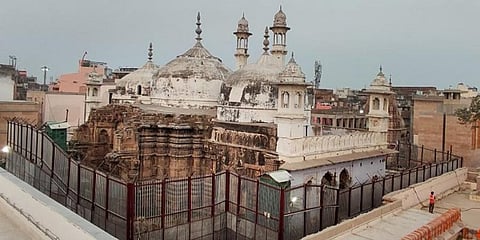

LUCKNOW: The Varanasi district court, on Thursday, reserved its order on the plea filed by Hindu plaintiffs seeking carbon dating of Shivlinga-like structure which was found in the wazukhana of Gyanvapi mosque during a survey in May, this year.
After hearing the arguments of the Hindu and the Anjuman Intezamia Masajid (AIM) -- the mosque management committee-- over the application seeking carbon dating, district judge Dr Ajay Krishna Vishvesha, posted the matter, for pronouncement of the order, on October 7.
During the hearing, while AIM vehemently opposed the carbon dating of the structure found in the ablution pond of the mosque saying it was not a Shivlinga but just a fountain, Hindu plaintiff number 1, Rakhi Singh, also opposed the procedure of carbon dating claiming it could damage the Shivlinga-like structure and would also hurt the religious sentiments of Sanatani Hindus who believed that the Gods had no age and it could not be ascertained through any procedure.
The other Hindu women plaintiffs number 2 to 5, had submitted an application through their lawyer Vishnu Shankar Jain, on September 22 seeking carbon dating and scientific probe to ascertain the antiquity of the structure.
According to Vishnu Shankar Jain, representing Hindu plaintiffs number 2-5 in the case, the AIM opposed the application saying the structure found in wazukhana could not be examined and no survey could be held under Order 26 of Rule 10 of Code of Civil Procedure (CPC). However, responding to AIM's argument, Jain claimed that the Hindu lawyers informed the court that it had the power under the same provision of CPC to issue a survey of scientific investigation.
Jain added that when the four Hindu women plaintiffs had moved the Supreme Court of India seeking a survey of the structure by the Archaeological Survey of India (ASI), the apex court had asked them to present their side in the district court.
"We referred to the SC order of May 20 by which the apex court had empowered the Varanasi district judge to decide all applications," said Jain adding that hence the district court reserved the order on the application.
Meanwhile, calling the demand of other Hindu plaintiffs to issue an ASI commission to determine the age, nature and other constituents of the Shivlinga-like structure which was found on May 16, through carbon dating, as misconceived and ridiculous, the lawyers of Rakhi Singh, plaintiff number 1, claimed that it could damage the Shivlinga and would not serve the purpose of the suit.
The lawyers of Rakhi Singh also said that in case Shivlinga would get damaged during carbon dating, it would not remain worth worshipping and the sentiments of Hindus would be hurt.
The lawyers of Rakhi Singh claimed that Shivlinga himself was unrefutable evidence of his existence.